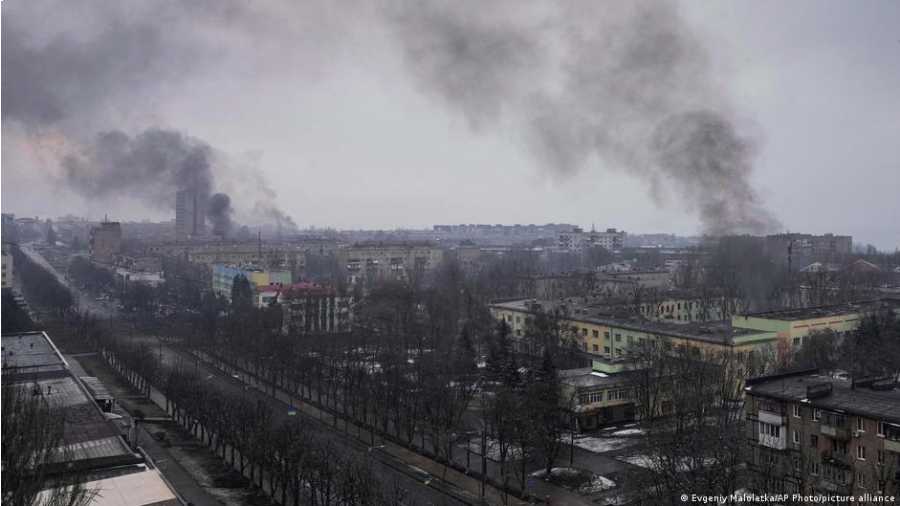Ukraine on Monday rejected Russian calls to surrender the port city of Mariupol, where residents are besieged with little food, water and power and fierce fighting shows little sign of easing.
"There can be no question of any surrender, laying down of arms," the Ukrainska Pravda news portal cited Ukraine's Deputy Prime Minister Iryna Vereshchuk as saying early on Monday.
"We have already informed the Russian side about this."
Russia earlier called on Ukrainian forces in Mariupol to lay down their arms, saying a "terrible humanitarian catastrophe" was unfolding.
It said defenders who did so were guaranteed safe passage out of the city and humanitarian corridors would be opened from 1000 Moscow time (0700 GMT) on Monday.
Mariupol has suffered some of the heaviest bombardments since Russia invaded Ukraine on Feb. 24. Many of its 400,000 residents remain trapped with little if any food, water and power.
Fighting continued inside the city on Sunday, regional governor Pavlo Kyrylenko said, without elaborating.
Vereshchuk said over 7,000 people were evacuated from Ukrainian cities through humanitarian corridors on Sunday, more than half from Mariupol. She said the government planned to send nearly 50 buses there on Monday for further evacuations.
Russia and Ukraine have made agreements throughout the war on humanitarian corridors to evacuate civilians, but have accused each other of frequent violations of those.
In his latest appeal for help from abroad, Ukrainian President Volodymyr Zelensky addressed the Israeli parliament by video link on Sunday and questioned Israel's reluctance to sell its Iron Dome missile defence system to Ukraine.
"Everybody knows that your missile defence systems are the best... and that you can definitely help our people, save the lives of Ukrainians, of Ukrainian Jews," said Zelensky, who is of Jewish heritage.
Speaking in his daily video appeal to Ukrainians, Zelensky later welcomed the mediation efforts of Israeli Prime Minister Naftali Bennett, who has held numerous calls with him and Russian President Vladimir Putin.
"Mr. Bennett is trying to find a way of holding talks... We are grateful for his efforts, so that sooner or later we will begin to have talks with Russia, possibly in Jerusalem," Zelensky said.
"That's the right place to find peace. If possible."
Mariupol's council said on Telegram that several thousand residents had been "deported" to Russia over the past week. Russian news agencies said buses had carried hundreds of refugees from Mariupol to Russia in recent days.
U.S. ambassador to the United Nations Linda Thomas-Greenfield told CNN the deportation accounts were "disturbing" and "unconscionable" if true, but said Washington had not yet confirmed them.
Reuters could not independently verify the claims. Russia denies targeting civilians.
Greece's consul general in Mariupol, the last EU diplomat to evacuate the city, said it was joining the ranks of places known for having been destroyed in wars.
"What I saw, I hope no one will ever see," he said.
FEW ADVANCES
Capturing Mariupol would help Russian forces secure a land corridor to the Crimea peninsula that Moscow annexed from Ukraine in 2014.
Putin says Russia's "special operation" is aimed at disarming Ukraine and rooting out dangerous nationalists. Western nations call it an aggressive war of choice and have imposed punishing sanctions aimed at crippling Russia's economy.
Ukraine and its Western backers say Russian ground forces have made few advances in the last week, concentrating instead on artillery and missile strikes.
Zelensky's adviser Oleksiy Arestovych said on Sunday there had been a relative lull over the past 24 hours, with "practically no rocket strikes on cities". He said front lines were "practically frozen".
Later on Sunday, however, Kyiv mayor Vitali Klitschko reported several explosions in the capital's Podil district and said rescue teams were putting out a large fire at the shopping centre. He said at least one person was killed.
Reuters was not able to immediately verify the report.
The U.N. human rights office said at least 902 civilians had been killed as of Saturday, though the real toll was probably much higher.
Some 10 million Ukrainians had been displaced, including some 3.4 million who have fled to neighbouring countries such as Poland, the U.N. refugee agency said. Officials in the region said they were reaching capacity to comfortably house refugees.
Kyiv and Moscow reported some progress last week toward a political formula that would guarantee Ukraine's security, while keeping it outside NATO - a key Russian demand - though each side accused the other of dragging things out.
Foreign Minister Mevlut Cavusoglu of Turkey, which like Israel has tried to mediate, said in an interview published on Sunday that the sides were getting closer to agreement on "critical" issues.
In the southern city of Kherson, video seen by Reuters showed dozens of protesters, some wrapped in Ukraine's blue-and-yellow flag, chanting "Go home" in Russian at two military vehicles with Russian markings. The vehicles turned and left.
"I want the war to be over, I want them (Russian forces) to leave Ukraine in peace," said Margarita Morozova, 87, who survived Nazi Germany's siege of Leningrad in World War Two and has lived in Kharkiv, eastern Ukraine, for the past 60 years.










